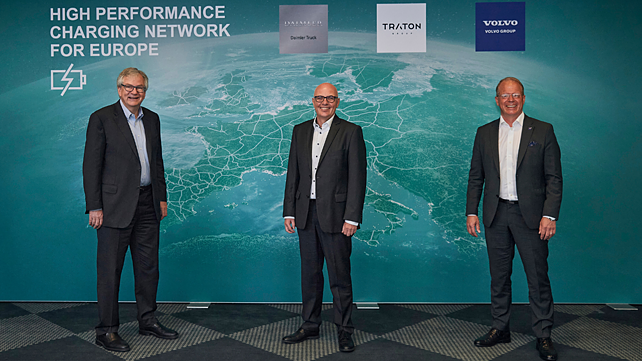
To initiate and accelerate the build-up of charging infrastructure that will enhance customer confidence and also support the EU’s transformation to climate-neutral transportation, Daimler Truck, Traton Group and Volvo Group have signed a non-binding agreement.
Accordingly, the three companies will install and operate a high-performance public charging network for battery electric heavy-duty long-haul trucks and coaches across Europe.
The agreement lays the foundation of a future joint venture (JV) - equally owned by the three companies, planning to start operations in 2022. The parties intend to invest together € 500 million to install and operate at least 1,700 high-performance green energy charging points close to highways and at logistic and destination points within five years from establishing the JV.
The joint action addresses the urgent need for a high-performance charging network to support truck operators with their transition to CO2-neutral transport solutions, especially in heavy-duty long-distance trucking. High-performance charging infrastructure enabling long-haul trucking is a cost-efficient way towards significant, fast-to-realise emission reductions.
According to Daimler that issued the press release, the number of charging points is, with time, intended to be increased significantly by seeking additional partners and public funding. In addition, the future JV is planned to operate under its own corporate identity and be based in Amsterdam, Netherlands.
The future JV will build on the broad experience and knowledge of its founding partners in heavy-duty trucking. It will act as a catalyst and enabler for realising the European Union’s Green Deal for carbon-neutral freight transportation by 2050 – both by providing the necessary infrastructure and targeting green energy at the charging points.
Martin Daum, CEO, Daimler Truck, said it is vital that building up the right infrastructure goes hand in hand with putting CO2-neutral trucks on the road.
Matthias Gründler, CEO, Traton Group, said that the future of transport is electric, which requires the rapid development of publicly accessible charging points, especially for long-distance heavy-duty transport. “We now make the first step to accelerate the transition towards sustainable, fossil-free transport. The second step should be a strong engagement of the EU for the full scale-up of a charging network across Europe.”
Martin Lundstedt, President and CEO, Volvo Group, said, “We are laying the necessary foundation in making a breakthrough for our customers to make the transformation to electrification by creating a European charging network leader.”